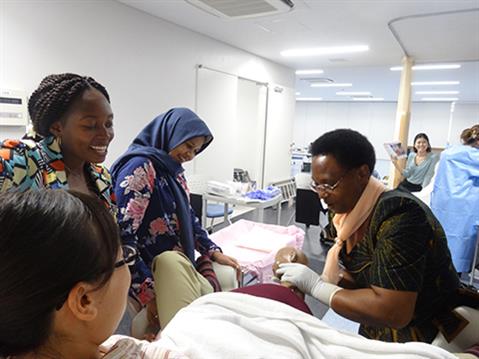
TOKYO - The WHO and multi-country joint seminar on Early Essential Newborn Care was conducted in St. Luke's International University Tokyo, Japan in October 2016. Midwives and nurses from Indonesia, Japan, Sierra Leone and Tanzania participated. Most participants practice and teach newborn care.
Through the seminar, facilitators from WHO and St. Luke's International University, provided coaching sessions on early essential newborn care (EENC) to midwives and nurses from developing countries. Participants are returning to their home countries – where newborn mortality rates are still high – ready to teach others best practices in EENC.
After coaching the first facilitators, seminars may be conducted in their countries in the near future. The seminar also provided opportunities for Japanese midwives and nurses to learn the situations of newborn care in low-resource countries so that they can work with nurses and midwives outside Japan.
Though participants were all unfamiliar with the coaching method, they enjoyed and learned a lot from the coaching. Their knowledge and skills improved, and they became more confident in using facilitation techniques. Dr Hiroshi Nishida, Professor Emeritus in Tokyo Women's Medical University Hospital, observing the training, commented: "I was so impressed by the excellent skill of bedside teaching."
The seminar was funded by Japan Society for the Promotion of Science. The format of the seminar encouraged all countries to compare their practices and learn from one another.
A key finding from the seminar was that it would be beneficial for Japanese global health workers to attend in future before they are dispatched to a developing country. The Japanese participants this time learned that their general practice was different from other countries, and that they should acquire knowledge and skills to provide technical support that is appropriate to different cultures and contexts.
St. Luke's International University has been a WHO collaborating centre since 1990 as Centre for Nursing Development in Primary Health Care and was re-designated in 2016. The new terms of reference focus on people-centred care for the population through the life-course: from the time of pregnancy and childbirth to older age. This includes promoting maternal and child health in the context of low-resource countries. The current main collaborators are Indonesia and Tanzania.
As the seminar was a great success, and practitioners from Indonesia and Tanzania are requesting the coaching be provided in their countries, the centre plans to continue the seminar next year in collaboration with WHO Regional Office for the Western Pacific.

/59748.tmb-300v.png?sfvrsn=9885965b_2)


